Woman accused in 2016 day care death aims to prove her innocence as wrongful conviction trial gets underway
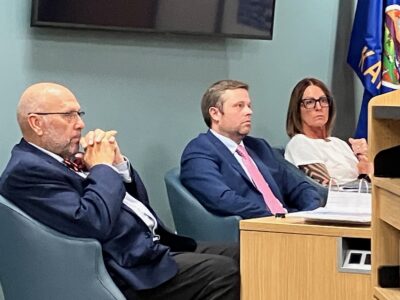
photo by: Kim Callahan/Journal-World
Carrody Buchhorn, right, appears with her attorneys, Bill Skepnek, left, and Quentin Templeton, Monday, Oct. 27, 2025, in Douglas County District Court.
Nine years after 9-month-old Oliver “Ollie” Ortiz died at a Eudora day care, the question of what killed him — natural causes or child abuse — remains legally unsettled, as does the innocence of the day care worker originally accused of murdering him.
That woman, Carrody Buchhorn, is attempting to clear her name in a wrongful conviction trial — three years in the making — that finally began Monday with the day care owner now testifying on Buchhorn’s behalf after having testified for the state in the criminal proceeding.

photo by: Kaylen Ortiz/Contributed Photo
Oliver “Ollie” Lynn Ortiz, pictured at 3 months old
In the jury-less trial, presided over by Chief Judge James McCabria, Buchhorn will need to demonstrate her innocence by a preponderance of the evidence — that is, 51%. If Buchhorn wins her lawsuit, she will be entitled to around $400,000, or $65,000 for each year of wrongful imprisonment. Buchhorn’s petition states that she was on house arrest or in the Douglas County Jail or the Topeka Correctional Facility for a total of 2,072 days, or more than 5.5 years.
But more important to her than money, her attorney Quentin Templeton said, is a certificate of innocence.
“Mrs. Buchhorn needs her piece of paper,” he told McCabria on Monday during his opening argument, “to stop everyone from judging her and accusing her,” so that she can get out from under the shadow of a murder allegation and get on with her life.
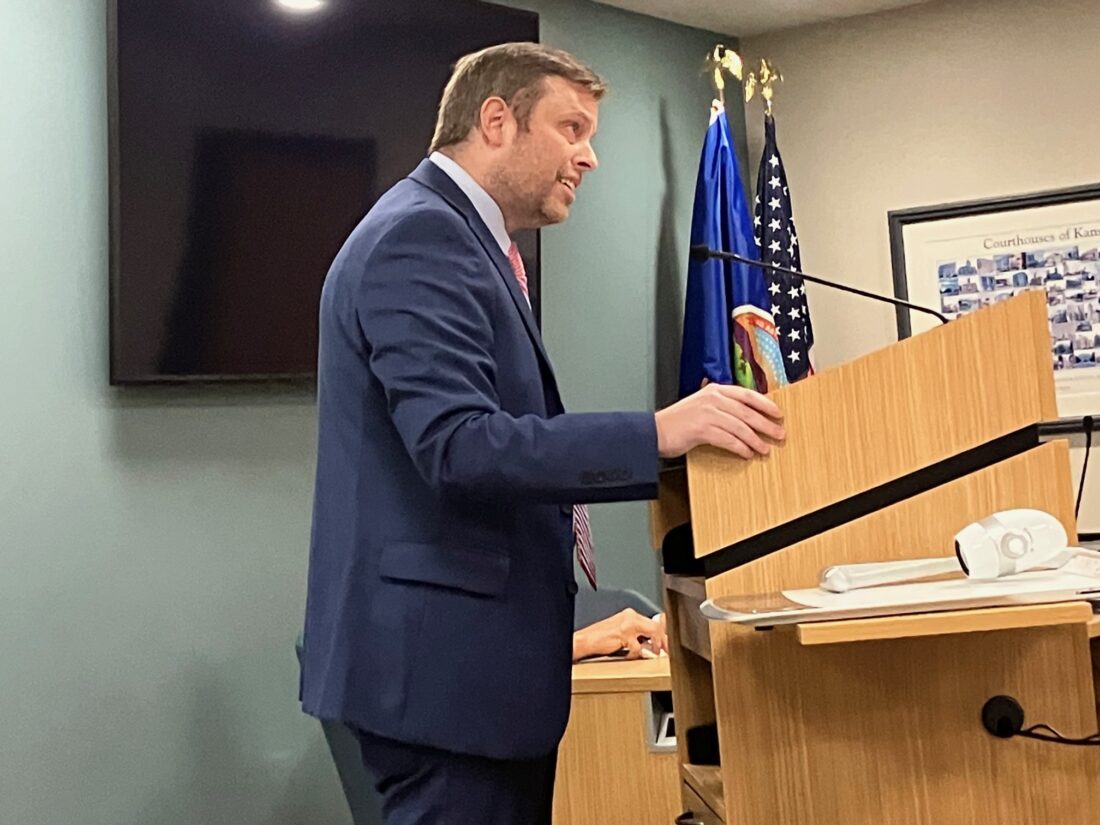
photo by: Kim Callahan/Journal-World
Attorney Quentin Templeton argues Carrody Buchhorn’s case Monday, Oct. 27, 2025, in Douglas County District Court.
During his opening, Templeton blasted the amount of time Buchhorn has had to live under that shadow. Oliver died on Sept. 29, 2016. Two years later, Buchhorn, then 48, was convicted of second-degree murder. That conviction was overturned by the Kansas Court of Appeals in August 2021 because Buchhorn’s trial attorneys were deemed to have provided ineffective assistance of counsel by not doing enough to oppose Coroner Erik Mitchell’s controversial finding of “depolarization” as the cause of death. That ruling was allowed to stand when the Kansas Supreme Court tied 3-3 in reviewing the case, with one justice labeling depolarization as “just bunk.”
Douglas County District Attorney Suzanne Valdez vowed to retry Buchhorn, but after a protracted legal battle, eventually found a new forensic pathology expert who determined that Oliver had not died from child abuse but from pre-existing conditions, including a congenital heart defect and bacterial and viral infections. The DA’s office — nearly seven years after Oliver’s death — then announced that it would “cease prosecution” due to a lack of evidence. A month prior to that, Judge Sally Pokorny had dismissed the case over Valdez’s failure to meet the deadline for producing an expert who could testify about Oliver’s cause of death.
Valdez’s Jan. 4, 2023, press release announcing that decision is at the heart of the wrongful conviction trial because Buchhorn’s attorneys have argued that the press release was essentially an admission by the state that Oliver died of natural causes and that the state — which had already said it would not rely on the depolarization theory of Mitchell, who had fallen into disrepute — simply had no evidence.
Templeton argued that the state had produced no new evidence since the day of Valdez’s press release, though Valdez had since alluded to a new investigation and has said that she did not believe Buchhorn was ever actually innocent. A showing of innocence is required to win a wrongful conviction lawsuit, and demonstrating that a prosecutor dropped a case because of a belief in the defendant’s innocence is one way to accomplish an “innocence” showing under state statute.
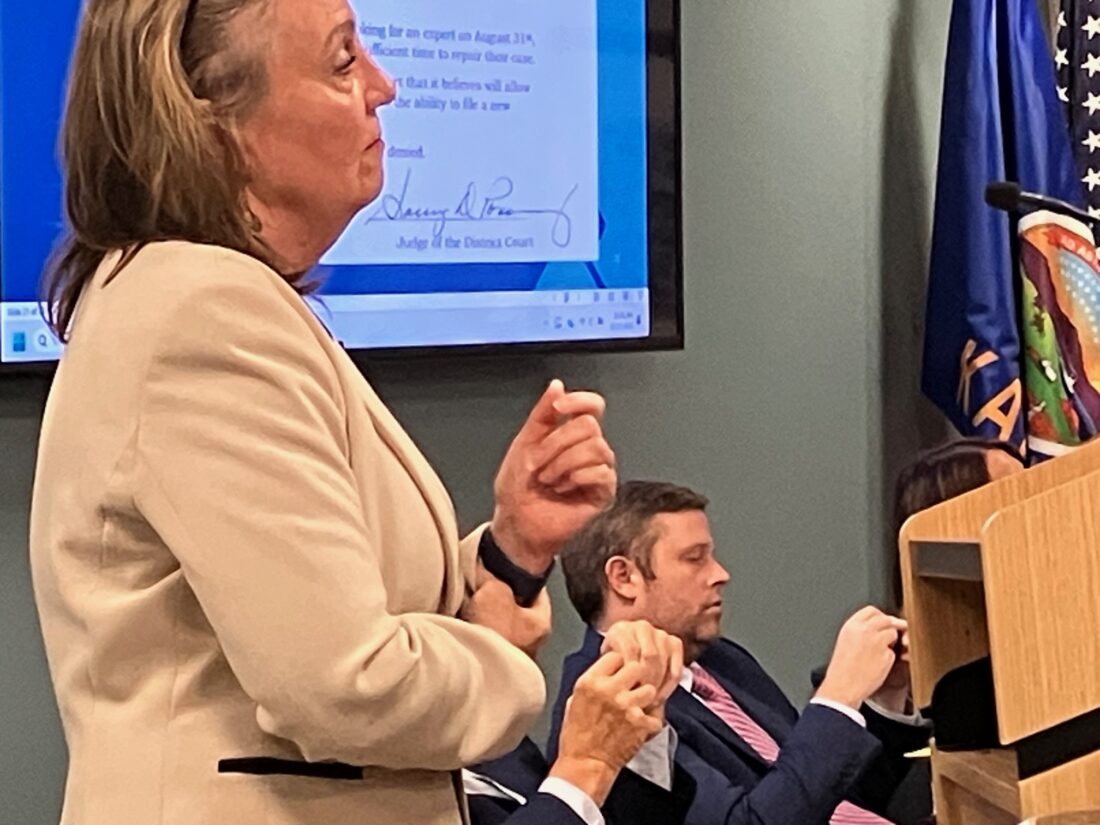
photo by: Kim Callahan/Journal-World
Attorney Gaye Tibbets argues on behalf of the state in the Carrody Buchhorn’s wrongful conviction trial Monday, Oct. 27, 2025, in Douglas County District Court.
The State of Kansas, represented by Gaye Tibbets, argued Monday that Valdez “could and did believe that Carrody Buchhorn was guilty” and had ceased pursuing the case as a matter of prosecutorial discretion, it being simply “too risky” to put the case in front of a jury with the limited evidence then at her disposal.
Valdez is expected to testify in the case later this week, as is Jane Turner, the pathologist who determined Oliver had died of natural causes. Tibbets said she would offer expert evidence that Oliver was a healthy baby on the day he died, contrary to what Turner had claimed.
Following opening arguments, Bill Skepnek, one of Buchhorn’s attorneys, called Gina Brunton to the stand. Brunton was the owner of the day care where Buchhorn worked. In Buchhorn’s criminal trial, Brunton had testified for the state, but on Monday she was Buchhorn’s witness.
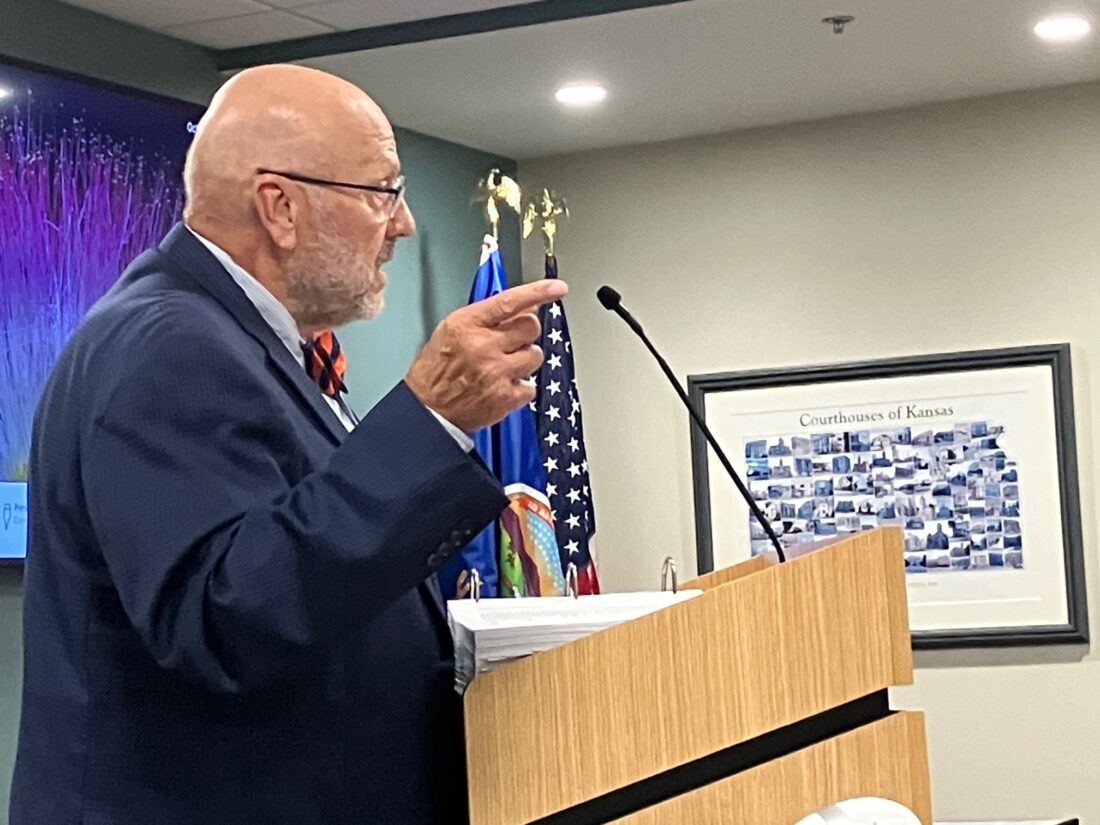
photo by: Kim Callahan/Journal-World
Attorney Bill Skepnek argues Carrody Buchhorn’s case on Monday, Oct. 27, 2025, in Douglas County District Court.
Brunton said that Buchhorn had worked for her for about 2.5 years and was a good employee who loved the children in her care, including Oliver, and that she couldn’t imagine her ever hurting a child. When confronted with texts Buchhorn had sent her best friend complaining about Brunton and calling her profane names, Brunton brushed them off as just a feature of Buchhorn’s “rough around the edges” personality — a trait that she said was never evident around the children.
Brunton said that until Sunday, save for a brief encounter at Walmart, she had not spoken to Buchhorn in nine years. She said she had always been led to believe that Oliver had died of blunt force trauma and had been told by authorities that the death had to have been caused by her or Buchhorn, the only two people with Oliver that afternoon. But she said she never wanted to believe that Buchhorn could do such a thing, and she testified that she, Brunton, had “said a lot of things that didn’t get heard” until now.
On Monday she told the court that Oliver pulled at his ear a lot, as if it were perhaps infected, and generally cried and screamed often, seemingly in real pain at times — issues that were discussed with his mother.
Three weeks before Oliver died, Brunton said, there was an especially unusual episode at the day care where Buchhorn noticed Oliver was limp and lethargic and, oddly, rejected his pacifier. Oliver’s mom was notified and came to get him. Later Buchhorn sent the mom a text to inquire about Oliver. He was doing better, Buchhorn learned, to which she replied: “Good, he seriously scared the living (expletive) out of me.”
Brunton said that on the day of Oliver’s death, she did not notice Buchhorn acting strangely at all or observe any marks of abuse on Oliver. She said Buchhorn scooped Oliver up after naptime, with his face away from her, and Brunton immediately noticed that Oliver’s eyelids were blue and he wasn’t responsive.
“It scared me,” she said, echoing Buchhorn’s remark from three weeks before Oliver’s death.
That’s when Buchhorn began performing CPR and Brunton called 911. Buchhorn had never performed CPR on a baby before, and Brunton was not sure whether Buchhorn was being “gentle” enough in her frantic effort to revive Oliver — testimony that will presumably go to the issue of whether Oliver’s body was injured in the effort to save him.
Brunton’s testimony is scheduled to continue on Tuesday.
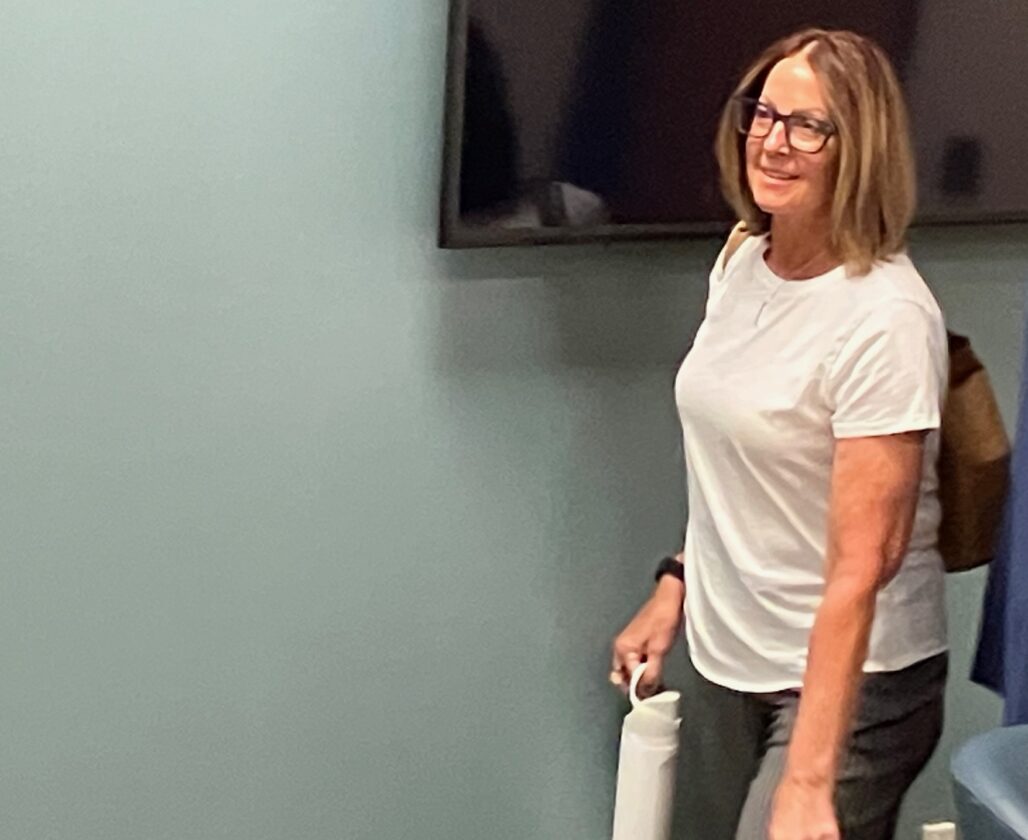
photo by: Kim Callahan/Journal-World
Carrody Buchhorn appears on Monday, Oct. 27, 2025, in Douglas County District Court.





